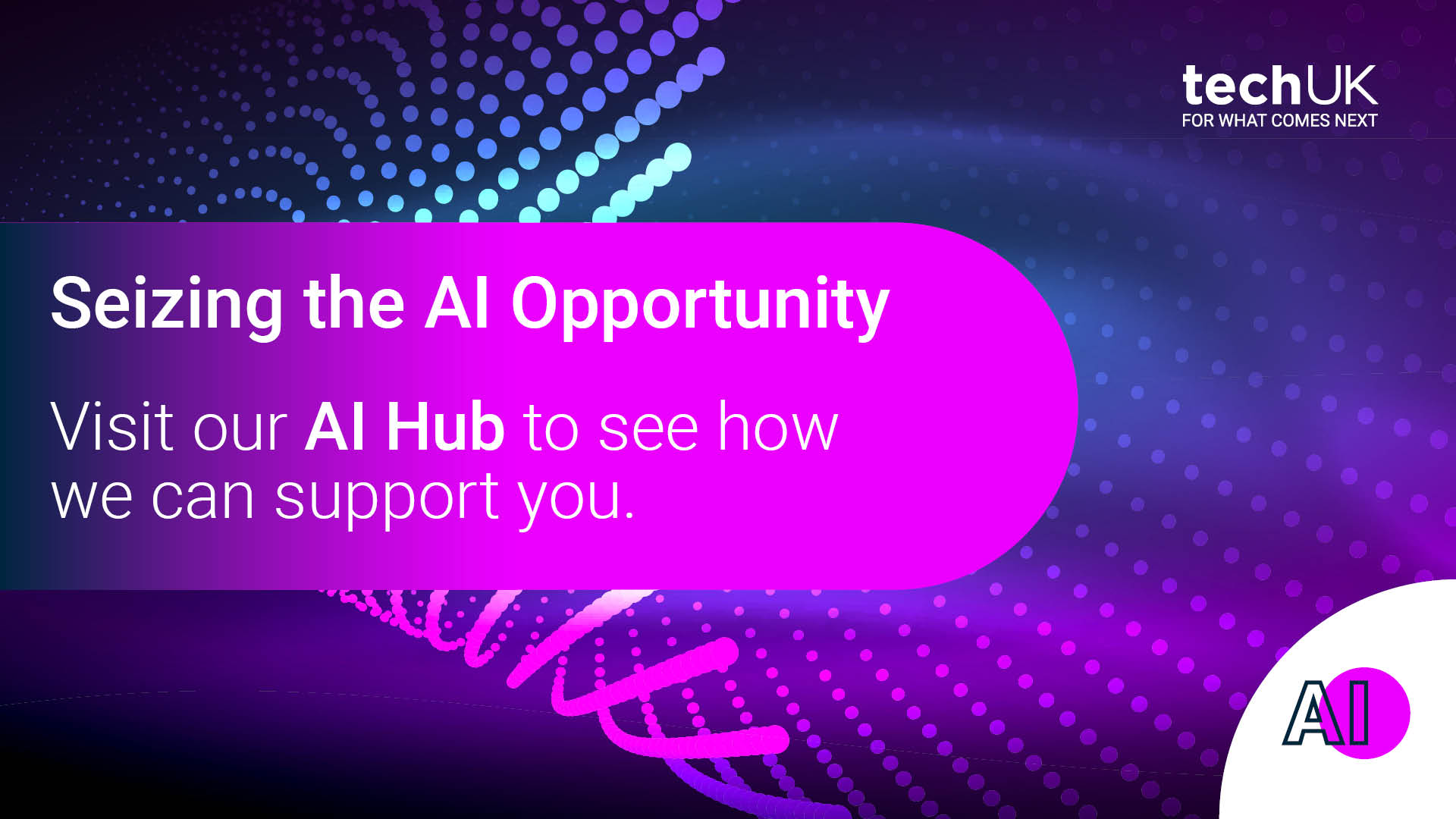AI Adoption Case Study: learn about Yoti's facial age estimation tool!
techUK’s AI adoption collection of case studies showcases examples of how organisations are Putting AI into Action, either through the adoption of AI models within their organisations, or by developing AI tools that can be leveraged by others.
By shining a light on these use cases, techUK hopes to demonstrate examples of best practice from across sectors and from organisations of all sizes.
1. Challenge:
One third of internet users are under the age of 18. With so many young people online, it’s important they have a safe and positive digital experience.
However, a lack of effective age verification online means that organisations can’t design age appropriate services and that some children are accessing inappropriate content.
Businesses and regulators around the world are looking at how to check someone’s age online. However, not everyone owns or has access to an identity document or credit card, and some people might not wish to share this information on lots of different websites each time they need to prove their age.
2. Solution
Yoti AI facial age estimation can determine a person's age from a live facial image, with no need to check identity documents or share personally identifiable information like name or address. The technology can correctly estimate if someone is above or below a certain age. It can be configured to work with age thresholds based on a business’ individual needs or to meet regulatory requirements. For instance, an online retailer could use it to strengthen Challenge 25 age checks, whereas a gaming platform could use it to give players different game features appropriate for their age.
Facial age estimation is an inclusive solution because it does not require people to use an identity document or credit card to prove their age. This is particularly important for children and young people as many don’t own or have access to an identity document.
The technology is quick, easy and simple to use with each age estimation taking around one second. This allows businesses to introduce effective age checks without adding unnecessary friction to the user experience.
Facial age estimation is also very private - there is no sharing of personally identifiable information like names, dates of birth or email addresses. The business only receives the age status (such as ‘yes this user is over 18’). This allows people to prove their age online anonymously. The image used to estimate someone’s age is immediately deleted once their age has been determined. This means there is no big database or honey pot of data for hackers to target.
3. Barriers:
Fairness: it’s important that the technology can help as many people as possible to prove their age in a privacy-preserving, effective and secure way. Therefore, the technology needs to work fairly for different ages, skin tones and genders.
Diverse data set collected in line with GDPR: to achieve this, the technology has been trained with diverse data. The source of the majority of Yoti’s training set comes from individuals from around the world who are over 13 and have added identity documents to the Yoti app and are informed about Yoti using their face and month and year of birth to train our age estimation technology. This means Yoti has a diverse set of 13-17 year olds as well as 18-70 year olds to train our algorithm. They’re able to opt-out of this processing at any time from within the app settings.
Where there are gaps in the data, Yoti performs data collection exercises by purchasing data from vetted suppliers - all collected with consent and in line with GDPR.
Explainability & regulatory recognition: ensuring the technology is recognised by regulators and explaining how it works in plain English for the people who use it is key.
- Yoti was selected to take part in the UK ICO Sandbox ahead of the UK Age Appropriate Design Code. Within the Sandbox, Yoti both extended the reach of the tool from age 6-70, and developed child friendly privacy terms and simple explainer materials, based on the Unicef principles for explaining AI to children.
- Yoti’s facial age estimation technology has been approved by the German regulator, KJM, for the highest level of age assurance. This means it can be used for 18+ adult content.
- Yoti has been cited in regulatory Ofcom guidance, in terms of effective age assurance for the VSP regime and age checking for adult content.
- Yoti regularly publishes straight forward white papers detailing the accuracy rates of our algorithm.
- Yoti writes and publishes content explaining how the technology works and why it is not facial recognition. The National Institute of Standards and Technology (NIST) has helpfully published a description of the difference between facial recognition and facial age estimation.
- The National Institute of Standards and Technology (NIST) has begun an independent, global benchmarking programme, which gives regulators, businesses and the general public confidence in the efficacy and accuracy of facial age estimation. Yoti facial age estimation is one of the first to be independently tested by NIST.
Yoti runs regulatory roundtables to engage with civil society, the media, businesses and regulators to explain how facial age estimation works, and to build trust and understanding in the technology.
4. Impact:
Leading brands have chosen Yoti facial age estimation as an age checking method to improve online safety and create age-appropriate experiences, including Instagram, Sony PlayStation, Epic Games, Yubo, XHamster, Lockwood Publishing, Facebook Dating and OnlyFans. So far, Yoti has completed over 650 million age checks worldwide.
- Yoti has worked with Instagram since 2022 to help them verify the ages of their users. 81% of individuals choose facial age estimation over uploading an identity document when asked to prove their age. As an additional step, Instagram has now introduced Teen Accounts where users under 18 are, by default, given the strictest privacy settings on their accounts.
- Following the success on Instagram, Meta also uses facial age estimation on Facebook Dating. This ensures that only adults can sign up and use the service, an important step in protecting children and young people online.
- Kids Web Services, part of Epic Games, is using Yoti facial age estimation as part of its parental verification and consent tool. Over 6.5 million parents have successfully used facial age estimation to prove their age to grant parental consent online.
- OnlyFans uses facial age estimation as a secure, privacy-preserving and robust way of age-checking their users, ensuring only adults can access their 18+ platform.
- In December 2023, Ofcom announced their draft guidance on highly effective age checks to stop children accessing online adult content. The guidance stated that operators must take care to implement privacy-preserving age assurance systems. Facial age estimation has been recognised by Ofcom as a ‘highly effective’ method for this purpose.
As regulation continues to evolve around the world, businesses are choosing to use facial age estimation as an effective yet frictionless way of checking age.
techUK - Seizing the AI Opportunity
The UK is a global leader in AI innovation, development and adoption.
AI has the potential to boost UK GDP by £550 billion by 2035, making adoption an urgent economic priority. techUK and our members are committed to working with the Government to turn the AI Opportunities Action Plan into reality. Together we can ensure the UK seizes the opportunities presented by AI technology and continues to be a world leader in AI development.
Get involved: techUK runs a busy calendar of activities including events, reports, and insights to demonstrate some of the most significant AI opportunities for the UK. Our AI Hub is where you will find details of all upcoming activity. We also send a monthly AI newsletter which you can subscribe to here.
Upcoming AI Events
Latest news and insights
Subscribe to our AI newsletter
AI and Data Analytics updates
Sign-up to our monthly newsletter to get the latest updates and opportunities from our AI and Data Analytics Programme straight to your inbox.
Contact the team
Visit our AI Hub - the home of all our AI content:

Enquire about membership:












